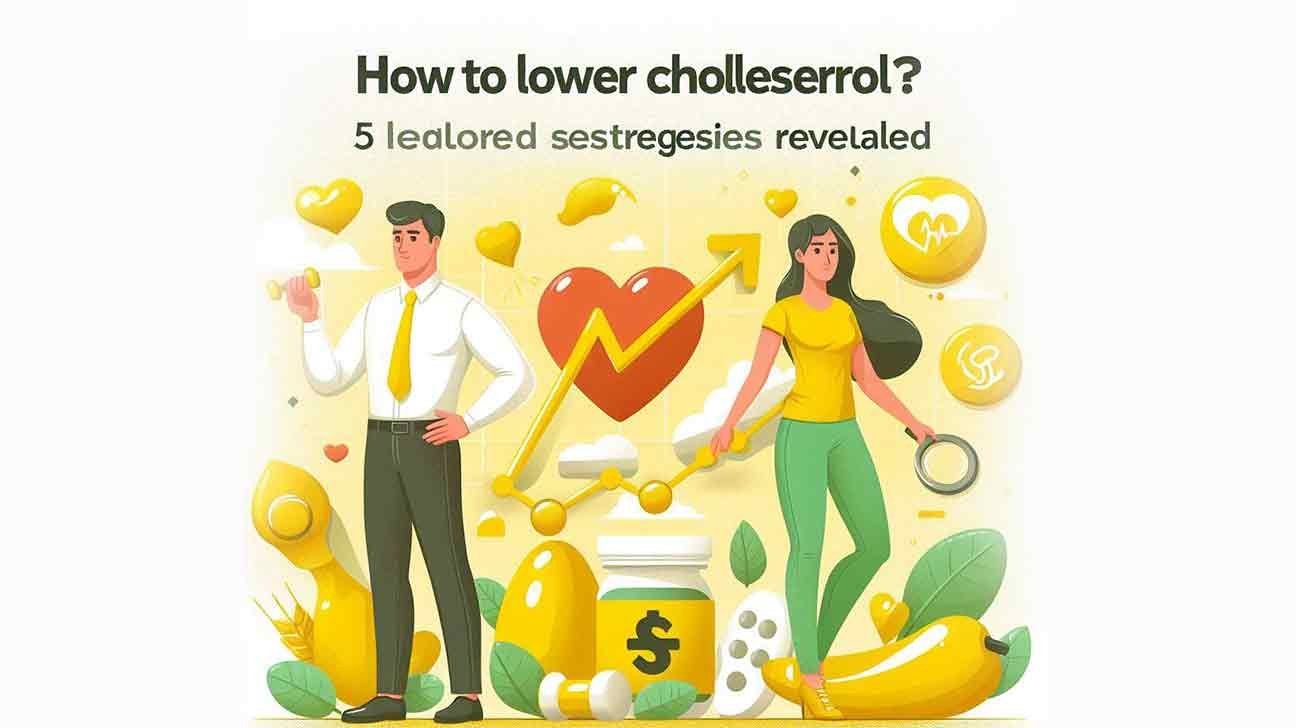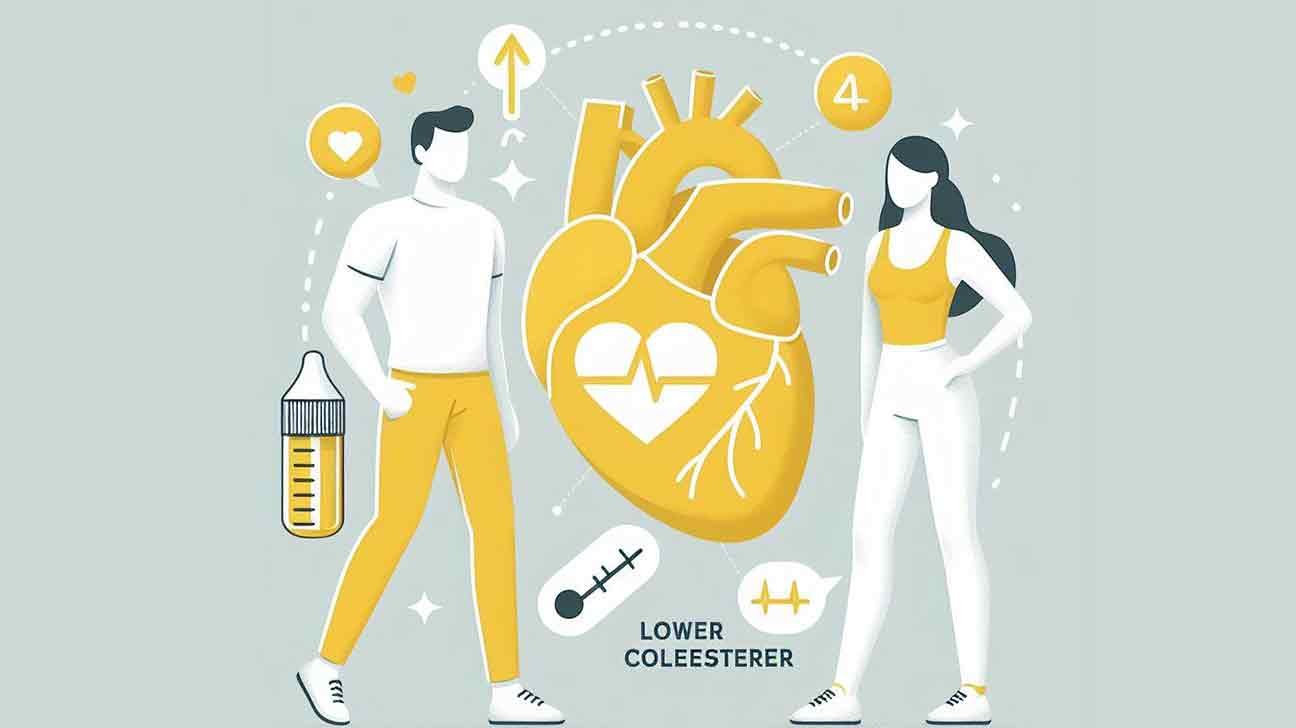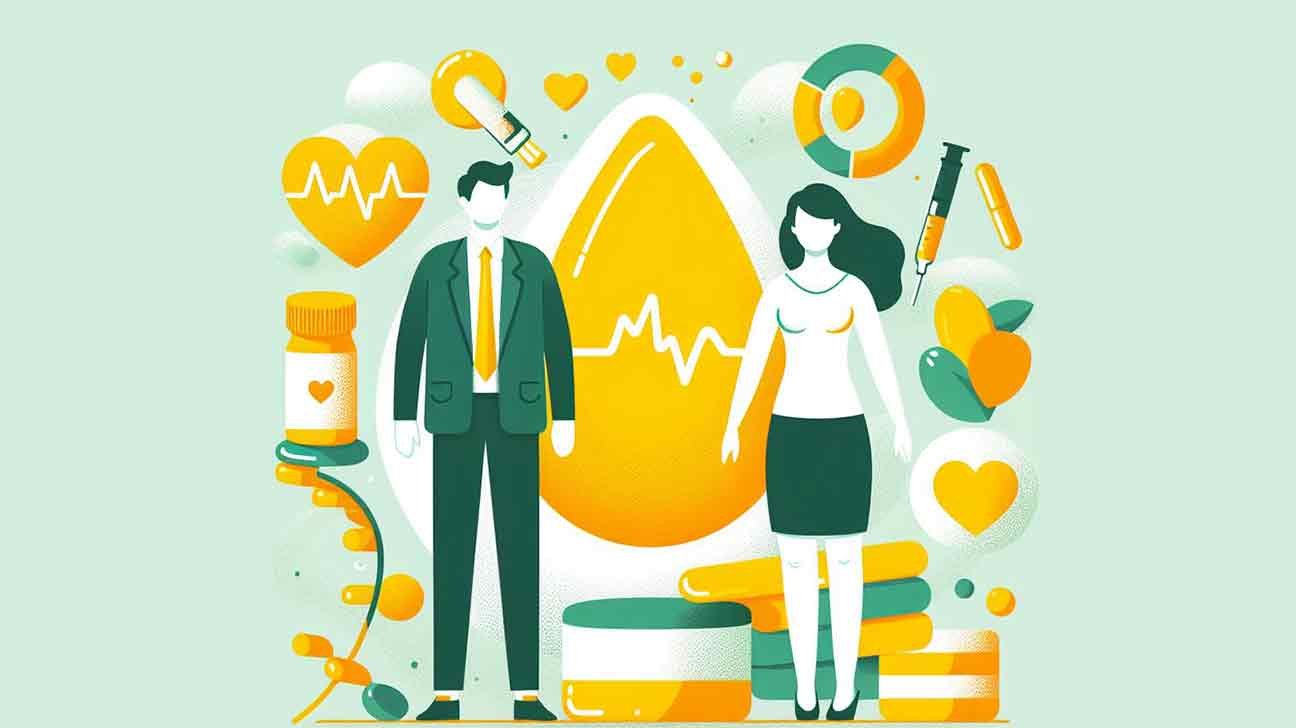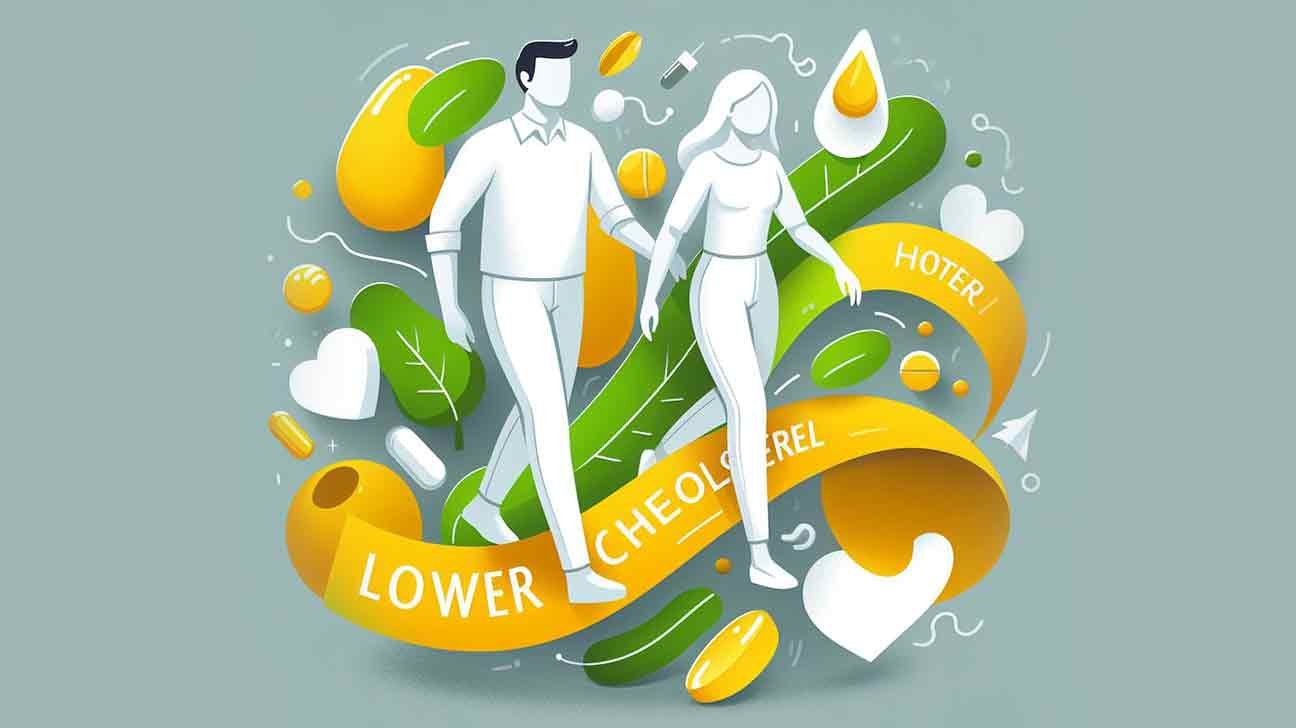High cholesterol itself is not commonly recognized as a direct cause of headaches. However, there are several indirect ways in which elevated cholesterol levels might be associated with headaches:
- Atherosclerosis and Reduced Blood Flow: High cholesterol can lead to the buildup of plaque in the arteries, a condition known as atherosclerosis. If this occurs in the arteries supplying the brain, it can reduce blood flow, potentially leading to headaches or migraines.
- Hypertension (High Blood Pressure): Elevated cholesterol levels are a risk factor for developing high blood pressure. Hypertension is a well-known cause of headaches, especially tension-type headaches and migraines. If high cholesterol contributes to high blood pressure, it may indirectly result in headaches.
- Medication Side Effects: Some medications used to manage high cholesterol, such as statins, may have side effects that include headaches. If you’re taking cholesterol-lowering medications and experiencing headaches, it’s important to discuss this with your healthcare provider.
- Metabolic Syndrome: High cholesterol is often a component of metabolic syndrome, which includes a cluster of conditions like insulin resistance, obesity, and high blood pressure. These conditions collectively can increase the likelihood of experiencing headaches.
- Inflammation: Chronic inflammation associated with high cholesterol levels may contribute to the development of headaches, although the exact mechanisms are not fully understood.
It’s important to note that headaches can be caused by a wide range of factors, including stress, dehydration, hormonal changes, and various medical conditions. If you’re experiencing frequent or severe headaches, it’s essential to consult with a healthcare professional to determine the underlying cause and receive appropriate treatment.
Managing High Cholesterol: To reduce the potential indirect effects of high cholesterol, consider the following strategies:
- Healthy Diet: Adopt a diet low in saturated fats, trans fats, and cholesterol. Incorporate plenty of fruits, vegetables, whole grains, and lean proteins.
- Regular Exercise: Engage in regular physical activity to help lower cholesterol levels and improve overall cardiovascular health.
- Medication Adherence: If prescribed cholesterol-lowering medications, take them as directed by your healthcare provider.
- Lifestyle Modifications: Maintain a healthy weight, avoid smoking, and limit alcohol consumption.
By managing high cholesterol through these methods, you can reduce the risk of associated complications that might contribute to headaches and other health issues.
If you suspect that your cholesterol levels are affecting your health or contributing to headaches, it’s advisable to seek medical advice for proper evaluation and treatment.
Low cholesterol
Low cholesterol, medically referred to as hypocholesterolemia, is a condition characterized by abnormally low levels of cholesterol in the blood. While high cholesterol often garners more attention due to its association with cardiovascular diseases, low cholesterol can also have significant health implications. This comprehensive overview explores the causes, effects, symptoms, and management of low cholesterol.
Understanding Cholesterol
Cholesterol is a waxy, fat-like substance essential for various bodily functions, including:
- Cell Membrane Structure: Cholesterol contributes to the integrity and fluidity of cell membranes.
- Hormone Production: It is a precursor for the synthesis of steroid hormones like estrogen, testosterone, and cortisol.
- Vitamin D Synthesis: Cholesterol aids in the production of vitamin D when the skin is exposed to sunlight.
- Bile Production: It is necessary for the formation of bile acids, which help in the digestion and absorption of dietary fats.
Cholesterol is transported in the blood by lipoproteins, primarily Low-Density Lipoprotein (LDL) and High-Density Lipoprotein (HDL). While high levels of LDL are associated with an increased risk of atherosclerosis and heart disease, HDL is considered protective as it helps remove excess cholesterol from the bloodstream.
What Constitutes Low Cholesterol?
Low cholesterol is typically defined based on total cholesterol levels in the blood. While exact thresholds can vary, the following ranges are commonly used:
- Desirable Total Cholesterol: Below 200 mg/dL (milligrams per deciliter)
- Low Total Cholesterol: Below 160 mg/dL
It’s important to note that optimal cholesterol levels can differ based on individual health profiles and risk factors.
Causes of Low Cholesterol
Several factors can contribute to abnormally low cholesterol levels:
1. Genetics
- Inherited Conditions: Certain genetic disorders can lead to hypocholesterolemia by affecting cholesterol synthesis and metabolism.
2. Malnutrition and Malabsorption
- Inadequate Dietary Intake: Extremely low-fat diets can result in insufficient cholesterol levels.
- Digestive Disorders: Conditions like celiac disease, Crohn’s disease, and other malabsorption syndromes can impair cholesterol absorption.
3. Chronic Diseases
- Liver Disease: The liver plays a central role in cholesterol production; liver dysfunction can reduce cholesterol synthesis.
- Hyperthyroidism: An overactive thyroid can increase cholesterol metabolism, leading to lower levels.
4. Medications
- Statins and Other Lipid-Lowering Drugs: While designed to reduce high cholesterol, excessive use can sometimes lower cholesterol too much.
- Other Medications: Certain antibiotics, antifungals, and psychiatric medications may impact cholesterol levels.
5. Cancer
- Advanced Cancers: Some cancers can disrupt normal cholesterol metabolism, leading to decreased levels.
6. Chronic Infections and Inflammation
- Severe Infections: Conditions like sepsis can alter lipid metabolism.
- Chronic Inflammatory Diseases: Long-term inflammation may impact cholesterol synthesis and clearance.
Symptoms and Health Effects of Low Cholesterol
While some individuals with low cholesterol may not experience noticeable symptoms, others may face various health challenges:
1. Physical Symptoms
- Hormonal Imbalances: Since cholesterol is a precursor for steroid hormones, low levels can affect hormone production, potentially leading to menstrual irregularities in women and reduced libido in men.
- Increased Risk of Hemorrhagic Stroke: Some studies suggest an association between low cholesterol and a higher risk of certain types of stroke.
- Weakened Immune Function: Cholesterol plays a role in immune responses; deficiencies may impair immune function.
2. Psychological Symptoms
- Depression and Anxiety: Emerging research indicates a potential link between low cholesterol levels and mood disorders.
- Aggression and Irritability: Some studies have associated low cholesterol with increased aggression and irritability.
3. Neurological Effects
- Cognitive Issues: There is ongoing research into how low cholesterol might affect cognitive functions and the risk of neurodegenerative diseases.
Health Implications of Low Cholesterol
The consequences of hypocholesterolemia can extend beyond immediate symptoms:
1. Mental Health Issues
Low cholesterol may influence serotonin pathways in the brain, potentially contributing to depression and other mood disorders. However, the exact relationship remains a subject of scientific investigation.
2. Hormonal Imbalances
Given cholesterol’s role in hormone synthesis, deficiencies can lead to:
- Reduced Production of Steroid Hormones: Affecting stress response, reproductive health, and metabolism.
- Potential Impact on Thyroid Function: As thyroid hormones interact closely with cholesterol metabolism.
3. Increased Risk of Certain Cancers
Some epidemiological studies have explored associations between low cholesterol levels and an increased risk of certain cancers, although causality has not been definitively established.
4. Hemorrhagic Stroke
Low cholesterol levels have been linked in some studies to an increased risk of hemorrhagic stroke, a type of stroke caused by bleeding in the brain.
Diagnosis
Diagnosing low cholesterol involves a combination of medical history, physical examination, and laboratory tests:
1. Blood Tests
- Lipid Panel: Measures total cholesterol, LDL, HDL, and triglycerides to assess overall lipid health.
- Additional Tests: May include liver function tests, thyroid function tests, and markers of inflammation to identify underlying causes.
2. Medical Evaluation
A healthcare provider will assess potential symptoms, dietary habits, medication use, and family history to determine the cause of low cholesterol.
Management and Treatment
Addressing low cholesterol focuses on identifying and treating the underlying cause:
1. Addressing Underlying Medical Conditions
- Treating Hyperthyroidism: Medications or therapies to regulate thyroid function.
- Managing Liver Diseases: Specific treatments based on the type and severity of liver dysfunction.
- Controlling Chronic Infections: Appropriate antimicrobial or anti-inflammatory treatments.
2. Dietary Adjustments
- Balanced Diet: Incorporating healthy fats from sources like avocados, nuts, seeds, and olive oil.
- Avoiding Extremely Low-Fat Diets: Ensuring adequate intake of dietary cholesterol as needed.
3. Medication Review
- Assessing Current Medications: Adjusting or changing lipid-lowering therapies if they contribute to excessively low cholesterol.
- Monitoring Side Effects: Regular check-ups to monitor cholesterol levels and overall health.
4. Lifestyle Modifications
- Regular Exercise: Promotes overall health and can help regulate lipid levels.
- Stress Management: Techniques like meditation, yoga, and counseling to support mental health.
Preventive Measures
Preventing low cholesterol involves maintaining a balanced approach to diet and health:
- Balanced Nutrition: Ensuring adequate intake of fats, proteins, and carbohydrates.
- Regular Medical Check-Ups: Monitoring cholesterol levels, especially if on lipid-lowering medications.
- Managing Chronic Conditions: Effective control of diseases that can impact cholesterol metabolism.
When to Seek Medical Advice
If you experience symptoms such as unexplained fatigue, hormonal imbalances, mood changes, or other health issues potentially linked to low cholesterol, it’s essential to consult a healthcare professional. They can perform appropriate evaluations, identify underlying causes, and recommend suitable treatments.
Conclusion
While low cholesterol is less commonly discussed than high cholesterol, it can have significant health implications affecting physical and mental well-being. Understanding the causes, recognizing the symptoms, and seeking appropriate medical guidance are crucial steps in managing hypocholesterolemia. Maintaining balanced cholesterol levels through a healthy lifestyle and addressing underlying health conditions can support overall health and reduce the risk of associated complications.
Disclaimer: This information is intended for educational purposes only and does not constitute medical advice. Always consult with a qualified healthcare professional for medical guidance tailored to your individual health needs.

To lower cholesterol, adopt a diet rich in fiber and omega-3 fatty acids, and engage in regular physical activity. Avoid trans fats and reduce saturated fat intake to manage cholesterol levels effectively.
Maintaining healthy cholesterol levels is crucial for cardiovascular well-being. Elevated cholesterol can lead to heart disease, making it important for individuals to take proactive steps towards managing it. Diet plays a pivotal role; incorporating fruits, vegetables, whole grains, and lean proteins can make a significant difference.
Exercise is another key factor; even 30 minutes of moderate-intensity activity each day can improve cholesterol profiles. Additionally, quitting smoking and limiting alcohol consumption are vital in achieving lower choles-terol. For those who require extra help, medications prescribed by a healthcare provider can also aid in controlling this levels. Tailoring lifestyle choices to meet these recommendations can lead to improved health and a reduced risk of heart-related issues.
Understanding Cholesterol
It might seem like a health villain, but your body needs it. We need cholesterol to build cells and make vitamins. Yet too much of it poses risks. This section breaks down what cholesterol is, its types, and why balance is crucial.
What Is Cholesterol?
Think of cholesterol as a waxy substance. It’s found in your blood and cells. Your liver makes the cholesterol your body requires. The foods you eat also add to your cholesterol levels.
Types Of Cholesterol
Cholesterol travels in packages called lipoproteins. There are two main types:
- HDL (High-density lipoprotein): This is the ‘good’ cholesterol. It helps remove other forms of cholesterol from your bloodstream. Higher levels are better.
- LDL (Low-density lipoprotein): This is the ‘bad’ cholesterol. High levels can lead to plaque buildup in arteries and heart disease.
Triglycerides, a type of fat, often tag along with cholesterol. High triglycerides plus high LDL or low HDL levels can increase disease risk.
Risk Factors For High Cholesterol
Understanding the risk factors for high cholesterol is crucial for prevention and management. By recognizing what contributes to elevated cholesterol levels, individuals can take proactive measures to maintain heart health. Let’s explore these risk factors in detail.
Unhealthy Diet
Eating foods high in cholesterol, saturated fats, and trans fats greatly impacts cholesterol levels. Limit intake of the following:
- Fried foods
- Processed snacks
- Fatty meats
Lack Of Physical Activity
Regular exercise plays a key role in lowering bad cholesterol. Aim for at least 30 minutes of moderate exercise most days of the week. Activities could include:
- Brisk walking
- Cycling
- Swimming
Obesity
Carrying excess body weight can elevate this levels. Target a healthy Body Mass Index (BMI) by:
- Eating a balanced diet
- Incorporating regular physical activity
- Limiting sugar and refined carbohydrates
Genetics
Genetics can affect your cholesterol levels regardless of lifestyle. If high cholesterol runs in your family, consult a healthcare provider for guidance and possible treatment options.
Lifestyle Changes
Embarking on a journey to lower-cholesterol often starts with a vital element: lifestyle changes. These adjustments in daily activities can significantly impact cholesterol levels. Let’s dive into the effective strategies for a healthier heart.
Healthy Eating Habits
Eating the right foods is crucial for keeping cholesterol in check. Focus on a diet rich in fruits, vegetables, whole grains, and lean proteins. Here’s how to make smart choices:
- Choose high-fiber foods like oats and beans.
- Opt for healthy fats found in avocados and olive oil.
- Avoid trans fats and limit saturated fats.
- Incorporate fish high in omega-3 fatty acids.
Regular Exercise
Staying active is a tried and true way to lower cholesterol. Aim for at least 30 minutes of moderate exercise most days. Keep it fun and engaging:
- Take brisk walks in your neighborhood.
- Join a local gym or fitness class.
- Ride a bike or swim for a full-body workout.
- Try yoga for stress relief and flexibility.
Smoking Cessation
Quitting smoking can dramatically improve heart health. Smoking lowers good HDL cholesterol and damages blood vessels. Use these tips:
- Seek support from quit-smoking programs.
- Use nicotine replacement therapies if needed.
- Stay motivated with personal wellness goals.
Reducing Alcohol Intake
Alcohol can affect cholesterol levels. To maintain a healthy balance:
- Limit consumption to one drink per day for women.
- Limit to two drinks per day for men.
- Choose drinks lower in alcohol and calories.

Dietary Approaches
Embarking on the journey to lower cholesterol starts with the foods we eat. Dietary Approaches play a critical role in managing and maintaining healthy cholesterol levels. Let’s explore specific diet strategies tailored to keep those numbers in check.
Foods To Include
Introducing the right types of food is essential for control this deases. Here’s what to focus on:
- Oats and Barley: Start mornings with a bowl of oatmeal.
- Leafy Greens: Spinach and kale support heart health.
- Fruits: Apples, grapes, and citrus are great snack options.
- Fatty Fish: Salmon and mackerel, twice a week for omega-3s.
- Nuts: A handful of almonds or walnuts, perfect for snacking.
Foods To Avoid
Some foods can raise this levels. Limit or avoid the following:
- Fried Foods: High in trans fats, better skipped.
- Processed Meats: Sausages and hot dogs are full of saturated fats.
- Full-fat Dairy: Opt for low-fat or non-fat versions instead.
- Sugar-laden Foods: Cakes and cookies can spike cholesterol.
Importance Of Fiber
Fiber is a cholesterol-lowering powerhouse. Soluble fiber found in beans, legumes, and certain fruits works to impede cholesterol absorption. Aiming for 5-10 grams per day can make a significant difference.
Healthy Fats Vs. Unhealthy Fats
Knowing the difference between fat types is crucial:
| Healthy Fats | Unhealthy Fats |
|---|---|
| Monounsaturated | Trans Fats |
| Polyunsaturated | Saturated Fats |
| Omega-3s | Hydrogenated Oils |
Replace unhealthy fats with avocados, olive oil, and seeds for overall health improvement.
Medical Interventions
When diet and exercise are not enough, doctors may suggest medical treatments. These can lower cholesterol to a safe level. Medical interventions are sometimes necessary to reduce health risks.
Cholesterol-lowering Medications
Many people need medicines to manage high cholesterol. It come in various types:
- Statins – reduce cholesterol production in the liver.
- Bile Acid Sequestrants – decrease fat absorption.
- Fibrates – lower triglycerides and raise HDL cholesterol.
- Niacin – reduces LDL and triglycerides and boosts HDL.
- Cholesterol Absorption Inhibitors – limit the absorption of dietary cholesterol.
- PCSK9 Inhibitors – increase liver’s ability to remove LDL cholesterol from the blood.
Understanding Statins
Statins are often the first choice to treat high cholesterol. They can lower the risk of heart attacks and strokes. Here’s how they work:
| Function | Benefit |
|---|---|
| Reduce cholesterol production | Lower overall cholesterol |
| Stabilize blood vessel lining | Prevent blood clots |
| Decrease inflammation | Reduce the risk of heart diseases |
Other Treatment Options
Apart from statins, there are other treatment options as well:
- Lifestyle Changes: Continue with a healthy diet and regular exercise.
- Supplements: Some find benefits in natural supplements like fish oil or psyllium.
- Medical Procedures: In severe cases, procedures like LDL apheresis are used to filter cholesterol from the blood.
Consult with a healthcare provider to choose the best treatment for you.
Natural Remedies for Cholesterol
Are you searching for ways to lower your cholesterol naturally? Natural remedies offer a wealth of options to help manage cholesterol levels. From everyday ingredients to lesser-known supplements, the power of nature can be harnessed to support your heart health. Remember to always consult with a healthcare professional before starting any new regimen.
Effectiveness Of Plant Sterols
Plant sterols resemble cholesterol in structure, but they can actually help reduce the absorption of cholesterol in your intestines. Regular consumption of plant sterols can lead to notable drops in bad LDL cholesterol. Foods enriched with plant sterols, like certain spreads and juices, are available, or you can opt for natural sources such as nuts, seeds, and legumes.
Omega-3 Supplements
Omega-3 fatty acids are celebrated for their heart-healthy benefits. Found in fish like salmon and mackerel, these nutrients are pivotal for maintaining optimal cholesterol levels. For those who prefer supplements, Omega-3 capsules offer a convenient alternative. Regular intake of Omega-3s can support lower triglyceride levels, commonly associated with improved heart health.
Herbal Supplements
Certain herbs and supplements are believed to assist in managing cholesterol. Garlic, for instance, has the potential to slightly reduce cholesterol levels. Green tea is another popular choice known for its antioxidant properties, which may contribute to better heart health. Before opting for herbal supplements, it’s crucial to discuss with your doctor, as some can interact with medications.

Managing Stress
Stress plays a huge part in our overall health. It can affect how your body handles cholesterol. Learning to manage stress can help in lowering cholesterol levels. Let’s explore how stress impacts cholesterol and ways to reduce it effectively.
Impact On Cholesterol Levels
Too much stress can raise cholesterol. It does this by affecting habits and behaviors. These include overeating, inactivity, and increased smoking. All these can hike cholesterol. Stress hormones also might have direct effects, telling your body to release more cholesterol into your bloodstream.
Stress-reducing Techniques
Finding ways to manage stress is crucial for cholesterol. Below are easy techniques you can try:
- Exercise: Helps lower stress and cholesterol. Aim for 30 minutes, most days.
- Mindfulness: Practices like meditation calm the mind.
- Healthy eating: Focus on fruits, veggies, and whole grains.
- Good sleep: Aim for 7-8 hours each night.
- Socialize: Time with loved ones can lower stress.
| Activity | Stress Impact | Cholesterol Impact |
|---|---|---|
| Exercise | Reduces stress hormones | Lowers LDL, raises HDL |
| Mindfulness | Calms the mind | Improves heart rate and blood pressure |
| Healthy Eating | Lowers stress from diet concerns | Reduces bad fats, promotes good nutrients |
| Good Sleep | Improves mood and cognition | Facilitates body’s healing processes |
| Socialize | Decreases feelings of isolation | Encourages good habits and support |
All these techniques offer benefits that contribute to a healthier, stress-managed life. By focusing on reducing stress, you are not just improving your mental state, but also taking a significant step towards lowering cholesterol.
Regular Monitoring And Follow-up
Keeping tabs on cholesterol is a crucial step in maintaining a healthy heart. Regular monitoring and follow-ups go beyond the initial diagnosis. They serve as a proactive measure to prevent potential complications and to manage your heart health effectively. Understanding the significance of this practice can be a life-saver.
Importance Of Regular Checkups
Having your cholesterol levels checked regularly ensures you can take timely action.
- Avoid surprises: Frequent tests keep you informed.
- Adjust treatments: Health professionals can fine-tune your care plan.
- Mitigate risks: Early detection helps prevent heart disease.
Tracking Progress
Seeing improvement motivates continued healthy practices.
| Date | Total Cholesterol | LDL (Bad Cholesterol) | HDL (Good Cholesterol) | Triglycerides |
|---|---|---|---|---|
| Jan 1, 2023 | 220 mg/dL | 140 mg/dL | 50 mg/dL | 180 mg/dL |
| Apr 1, 2023 | 200 mg/dL | 120 mg/dL | 60 mg/dL | 150 mg/dL |
- Document changes to witness progress.
- Discuss results with your doctor each visit.
- Set goals for your next checkup.

Frequently Asked Questions On How To Lower Cholesterol?
What Foods Help Reduce Cholesterol Levels?
Eating a diet rich in fruits, vegetables, whole grains, and fatty fish can help reduce cholesterol levels. Foods like oats, nuts, beans, and plant-based sterols or stanols can also contribute to lower cholesterol.
Can Exercise Lower Cholesterol Effectively?
Yes, regular physical activity can help lower cholesterol levels. Aim for at least 30 minutes of moderate aerobic exercise, like brisk walking, five times a week to maintain healthy cholesterol.
How Does Fiber Affect Cholesterol Levels?
Soluble fiber, found in foods like beans, oats, and fruits, can help lower bad LDL cholesterol. It works by binding cholesterol in the digestive system, causing it to be excreted from the body.
Are There Natural Supplements To Lower Cholesterol?
Certain natural supplements, such as red yeast rice, omega-3 fatty acids, and psyllium, are known to assist in lowering cholesterol. However, always consult a healthcare professional before starting any supplement regimen.
Conclusion
Tackling high cholesterol can be straightforward with the right approach. Embrace a healthy diet, consistent exercise, and consult your doctor. Remember, small lifestyle changes can lead to significant health improvements. Take the first step towards a heart-healthy life today. Your future self will thank you.



